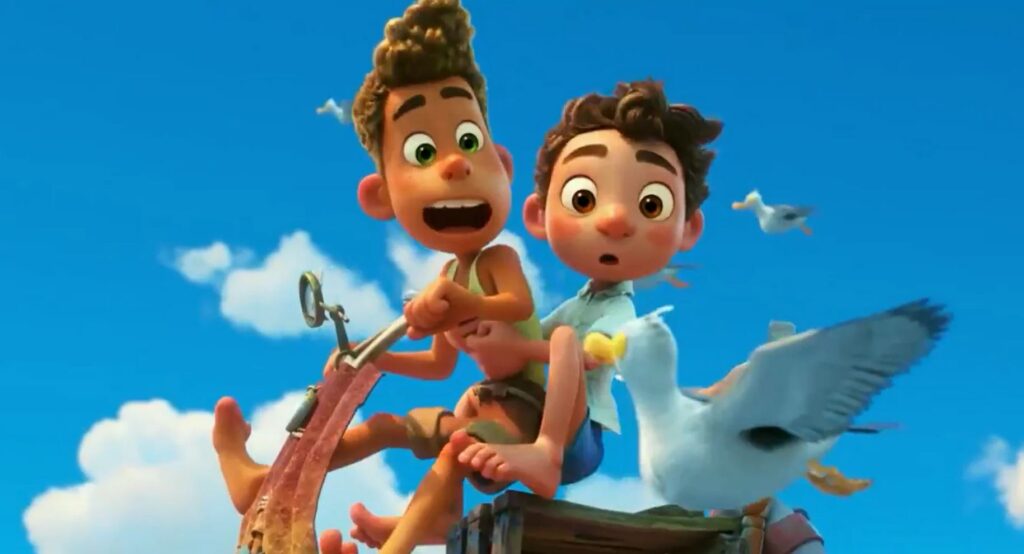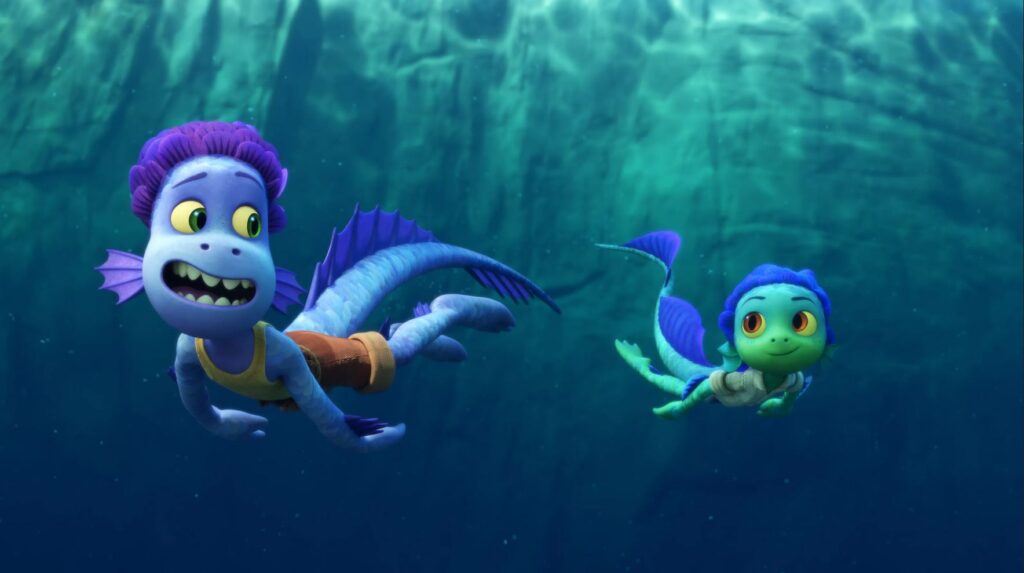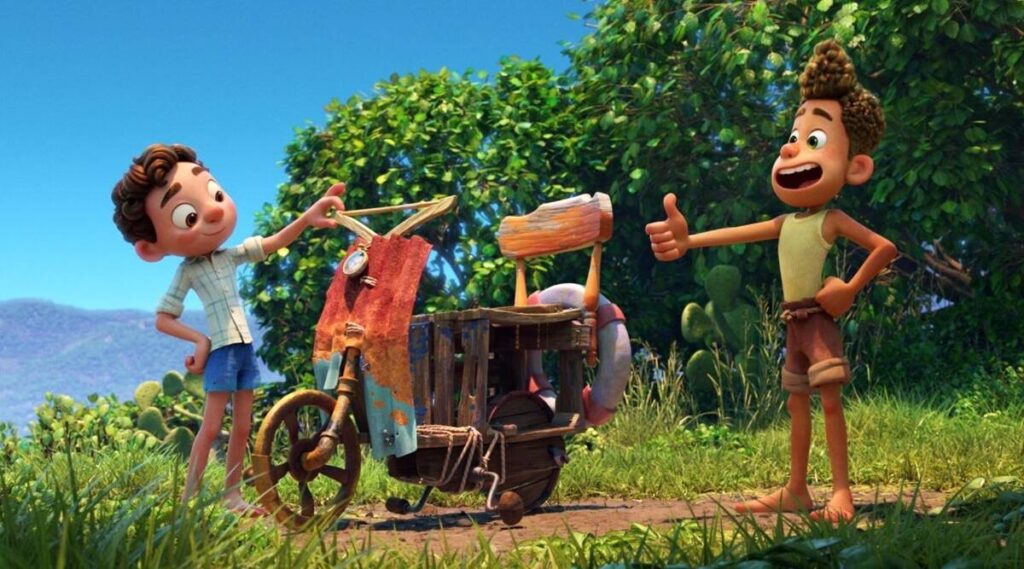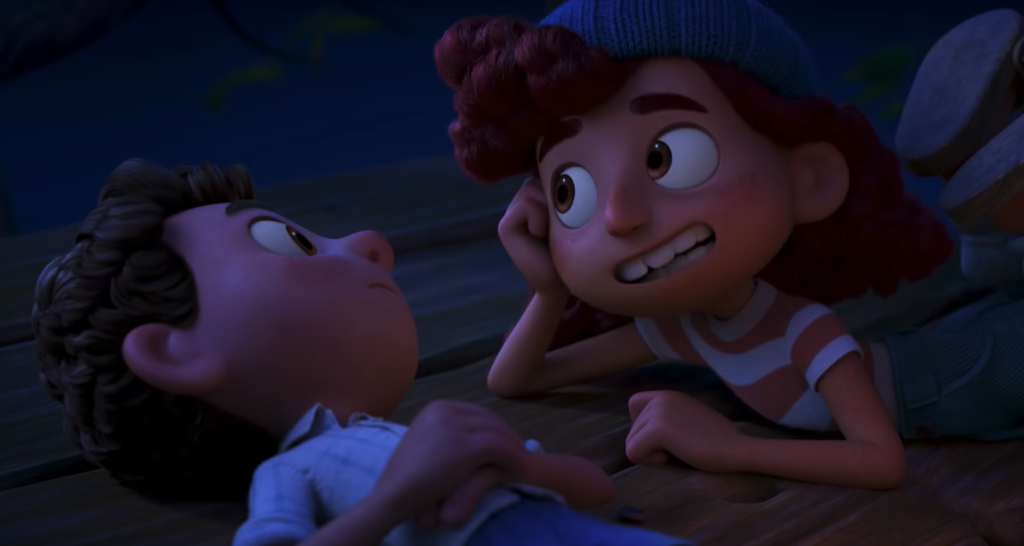
Luca is a shape-shifting sea monster, and Luca itself is something of a transformer. It is by turns (and sometimes all at once) a coming-of-age story, an underdog sports movie, an ode to canonical Italian cinema, and a heartfelt fable of tolerance. That it ably fulfills all of these roles without succumbing to chaos or incongruity is a testament to the dexterity of its storytelling and the fluidity of its construction. It doesn’t so much offer something for everyone as it provides everything for someones—namely, for those audiences who hunger for art that is simultaneously funny, kinetic, sweet, and affirming.
It is not—and with every new Pixar release, the conversation tends to focus on what it isn’t rather than what it is—terribly imaginative. Small in scale and gentle in heart, Luca lacks the bold ingenuity that has (ahem) animated some of the studio’s more impressive recent works: the metaphysical philosophizing of Soul, the existential angst of Toy Story 4, the triumphant razzle-dazzle of Incredibles 2, the anthropomorphized emotions of Inside Out. But not every Pixar picture can be expected to stretch or redefine an entire genre, and besides, lamenting Luca’s familiarity risks diminishing some of its considerable charm. Here is a playful, gorgeous, heart-warming adventure that tells its tender story with craft and conviction. That it occasionally resembles other movies seems a small price to pay.
In fact, that quality of resemblance is part of the film’s design. Luca, which is principally set in a fictional seaside town called Portorosso (and in the fauna-filled waters that border it), is the feature debut of Enrico Casarosa, a careful student of post-war Italian cinema who has made this movie in part as tribute to the masters of his youth. I myself, despite having seen a handful of Fellini films, am hardly an expert in these matters, but even a neophyte can appreciate the classical luster of the images and the glow of nostalgia that burnishes them. When its characters gaze contentedly into an amber sunset or clamber across rooftops backlit by an enormous moon, Luca acquires a soothing, halcyon warmth. The evident fondness on display is pure rather than wistful; in remembering the touchstones of his own youth, Casarosa strives to provide a new generation of children with their own set of happy cinematic memories.

Except that suggests a level of ambition that Luca doesn’t really seek to achieve, less a result of limited creativity than simple modesty. The plot, which incorporates strains of The Little Mermaid, Finding Nemo, and Luca Guadagnino’s Call Me By Your Name, centers on the titular sea monster (voiced by Jacob Tremblay), a pubescent creature with smooth green skin, wavy blue hair, and large brown eyes. When we first meet our young hero, he seems to make up both temperamental sides of Nemo’s father-son dynamic; he’s restless and dissatisfied with his daily duties, which seem to involve shepherding a large school of dim-witted fish, but he’s also fearful of what lurks above the surface of his maritime home. Eventually, his curiosity overcomes his hesitancy, and he emerges in brilliant sunlight onto a seemingly deserted island, where he instantly discovers two life-changing truths. First, he learns that when he leaves water for land, his merman-like body transforms into that of a human child. His second encounter is more external: It’s Alberto (Jack Dylan Grazer, who has his own experience coming of age on screen in Italy, having recently starred in Guadagnino’s We Are Who We Are), a fellow sea monster-boy hybrid who frolics freely on the island, untroubled by parents or any other type of authority figure.
The opening act of Luca, which explores the burgeoning friendship between Luca and Alberto, represents some of the loveliest and most luminous filmmaking Pixar has ever done. Alberto, it initially seems, is everything Luca is not: independent, fearless, worldly, empowered. Obviously it’s more complicated than that, but the scenes of Alberto teaching Luca how to embrace his newfound bipedal form—first instructing him on the basic technique of walking, then recruiting him for more elaborate, death-defying stunts involving a homemade tandem bicycle and a perilously rickety ramp—hum with glorious innocence and wonder. The animation is typically splendorous, and not just for the painterly colors or the vividly rendered environments (which are basically Pixar givens); it’s the characters’ facial expressions that are most impressive, the way their mouths and eyes (unlike Luca, Alberto sports an iridescent green pair) narrow and widen to convey sensations of excitement, affection, and joy.

And later, confusion, jealousy, and despair. But let’s not spoil things, even if Luca and Alberto’s inevitable sojourn from the island to Portorosso’s main square feels like a slight concession to the demands of plot-driven, family-friendly cinema. The two not-quite boys, spurred on by dreams of touring the countryside on a Vespa (Casarosa treats us to a couple of quick, charming fantasy sequences), resolve to acquire the necessary funds by winning a local junior triathlon, whose events include swimming, biking, and running pasta-chowing. To do so, they team up with Giulia (Emma Berman), a rambunctious loner armed with curly red hair, a knitted blue cap, and a thirst to prove herself. The screenplay, by Jesse Andrews and Mike Jones, conveniently posits Giulia as a misfit and outcast, which makes her a natural ally to our interloping heroes and a natural enemy to Ercole (Saverio Raimondo), the town’s preening hotshot who wins the competition every year even though he’s plainly too old to legally enter.
Despite some fun training mishaps—Luca must learn how to ride a bike, while Alberto must solve the mysteries of the fork—the triathlon subplot is Luca’s weakest element. Ercole is an easy and lazy villain, broadly drawn and thinly developed; he’s even followed around by two obeisant flunkies, the Goyle and Crabbe to his Draco Malfoy. And in building to the importance of a key race, the film threatens to veer into territory worn thin by the tedious Cars franchise.

Thankfully, Luca shines in other areas, most notably when it comes to charting the dynamics between children. In Giulia, Luca finds yet another kindred spirit, but one who challenges him in different ways than Alberto; he’s amazed at her breadth of knowledge, and she inspires in him a longing to discover more about the world. Their growing closeness results in corresponding resentment on Alberto’s part, though he surprisingly develops a symbiotic partnership with Giulia’s fisherman father, Massimo (Marco Barricelli), a hulking, soft-spoken man with an intimidating mustache. (Massimo’s suspicious cat, a panda-like creature with inquisitive yellow eyes named Machiavelli, looks an awful lot like Studio Ghibli’s Totoro; Hayao Miyazaki is another of Casarosa’s stated influences.) Whether any of the unnamed feelings bubbling around in the young characters’ heads are sexual in nature is a matter of viewer interpretation, but what seems inarguable is the clarity of the emotions, which Casarosa and his team articulate with piercing precision. A late scene on a beach features a sudden betrayal that’s so startling, I gasped in pain.
But that’s an outlier in a picture that’s so earnestly suffused with sweetness and compassion. Borne aloft by its exquisite visuals and Dan Romer’s delicate score, Luca in turn desires to lift you up, and its sentimentality feels sincere rather than manipulative. One of its putative plot points involves Luca and Alberto’s fear of getting rained on, as the moisture will cause their bodies to revert to their native, ostensibly monstrous form. This leads to a marvelous scene featuring an umbrella, but really, they had no need to worry. With a movie this gentle and warm, the sun is always shining.
Grade: B+
Jeremy Beck is the editor-in-chief of MovieManifesto. He watches more movies and television than he probably should.
